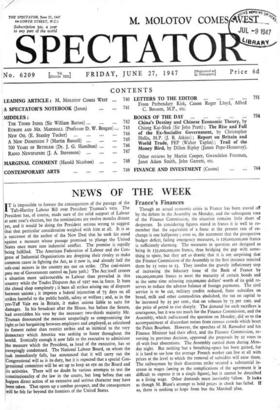NEWS OF THE WEEK
I T is impossible to foresee the consequences of the passage of the
Taft-Hartley Labour Bill over President Truman's veto. The President has, of course, made sure of the solid support of Labour at next year's election, but the nominations are twelve months distant yet, and it would be doing the President serious wrong to suggest that that particular consideration weighed with him at all. It is as a successor of the author of the New Deal that he took his stand against a measure whose passage promised to plunge the United States once more into industrial conflict. The promise is rapidly being fulfilled. The American Federation of Labour and the Con- gress of Industrial Organisations are dropping their rivalry to make common cause in fighting the Act, as it now is, and already half the soft-coal miners in the country are out on strike. (The coal-mines pass out of Government control on June 3oth.) The Act itself creates a situation more unfavourable to Labour than prevailed in this country while the Trades Disputes Act of 1927 was in force. It bans the closed shop completely ; it bans all strikes arising out of disputes between unions ; it imposes a federal injunction of 75 days on all strikes harmful to the public health, safety or welfare ; and, as in the pre-Taff Vale era in Britain, it makes unions liable to suits for damages. In his broadcast after the House, but before the Senate, ad overridden his veto by the necessary two-thirds majority Mr.
rutnan denounced the measure unsparingly as compromising the ight to fair bargaining between employers and employed, as calculated o foment rather than restrict strikes and as inimical to the very emocracy which America was seeking to foster throughout the orld. Ironically enough it now falls to the executive to administer
e measure which the President, as head of the executive, has so sweepingly condemned. The National Labour Board, on whom the task immediately falls, has announced that it will carry out the Congressional will as is its duty, but it is expected that a special Con- gressional committee will be set up to keep an eye on the Board and its activities. There will no doubt be various attempts to test the constitutionality of the law in the courts, but long before that can happen direct action of an extensive and serious character may have been taken. That opens up a sombre prospect, and the consequences will be felt far beyond the frontiers of the United States.


































